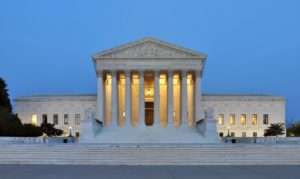The Volokh Conspiracy
Mostly law professors | Sometimes contrarian | Often libertarian | Always independent
Supreme Court Will Consider Trump Section 3 Disqualification Case
The justices will hear the case on an expedited schedule, and could potentially consider all the issues it raises.

This afternoon the Supreme Court agreed to review the Colorado Supreme Court decision disqualifying Trump from appearing on the state's ballot in the 2024 presidential election, under Section 3 of the Fourteenth Amendment. The case will be heard on an expedited schedule, with oral arguments scheduled for February 8, a little over one month from now. The justices likely chose to hear the case quickly so as to make sure it gets resolved before we go too much further into the 2024 election cycle.
Significantly, the Court has not limited the questions presented. That means the justices could potentially consider the full range of issues raised by the case, including whether the January 6 attack on the Capitol qualifies as an "insurrection," whether Trump's actions amount to "engaging" in insurrection, whether the president is an "officer of the United States" covered by Section 3, whether Section 3 is "self-executing," whether it is a "political question," and whether Trump got adequate due process in the state court. There may be some additional procedural questions, as well. But perhaps the Court will issue narrowing questions presented before briefs are due.
Most observers expect the Court to overturn the Colorado decision. That might well happen; it may even be the most likely outcome. But I think many are underrating the likelihood that the justices will affirm the Colorado ruling. The latter is based on strong reasoning, including from an originalist point of view. And to the extent the justices may be motivated by reputational considerations, disqualifying Trump is the perfect opportunity for them to show once and for all that they are not adjuncts of the GOP and especially not the "MAGA Court." In my view, much of the left-wing criticism of the Court is wrong or over overblown; but my opinion is not what's decisive for the Court's public and elite standing.
Of course, I'm far from a perfect prognosticator of what the justices will do. We'll likely get a better sense of where they stand during the oral argument.
I assessed the Colorado decision (which I think is largely correct) here. I went over the issues at stake in the Section 3 litigation in more detail in this article (written before the Colorado decision). In a September Lawfare article, I addressed various pragmatic and moral concerns raised by disqualification, such as claims that it would be anti-democratic and might create a dangerous slippery slope.


Show Comments (111)